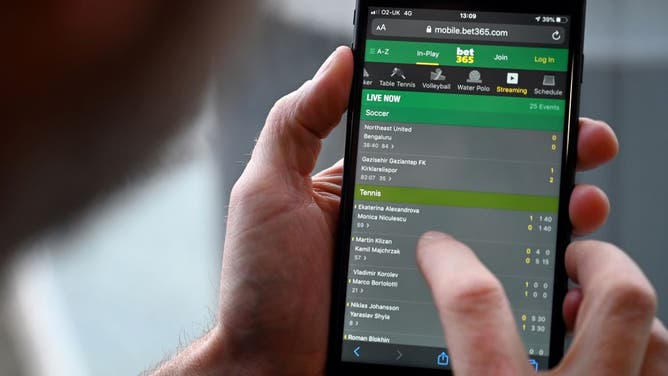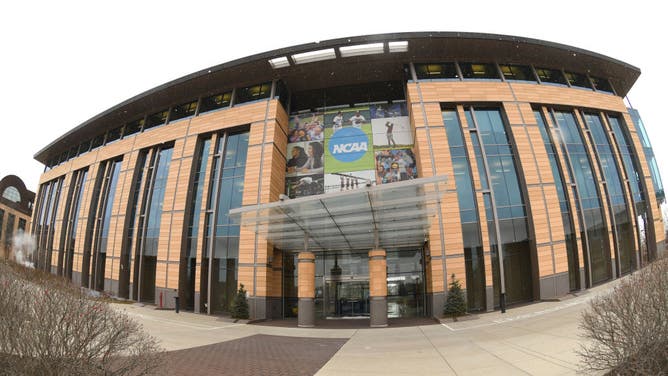The NCAA Might Have A Gambling Problem, And Now The Stakes Are Getting Higher | Trey Wallace
It started last week with the Alabama baseball program, and now it has spread to two more schools in the state of Iowa. Gambling has been a topic of discussion for conferences around college athletics over the past year, but it's now coming to a head.
Alabama fired baseball coach Brad Bohannon last week after he was alleged to have used a runner to place numerous bets at a sports book in Ohio. On Monday, news broke that Iowa and Iowa State both are dealing with problems stemming from student athletes and online gambling.
Iowa is dealing with an investigation into potential NCAA infractions regarding online wagering with 26 student athletes. Iowa State that it was investigating 15 athletes for gambling, adding to the problem. In total, that is 41 athletes in the state of Iowa currently under investigation for gambling.
The NCAA looks on as we sit at a crossroads between how schools are trying to prevent this type of situation and student athletes looking for ways around the system, which strictly prohibits gambling. Shouldn't we have seen this coming from a mile away when schools started partnering with gambling companies?
It wasn't long ago that schools were signing deals with online gambling companies, hoping to get a piece of the pie. Colorado signed an agreement with Pointsbet in 2020, with the school receiving kickbacks for new players using a referral code. LSU signed an agreement with Caesars sportsbook in 2021 to become the official gaming partner for LSU athletics.
“LSU has always taken pride in providing fans with unique, innovative, and world-class experiences, and our new partnership with Caesars Entertainment will do just that,” said LSU Athletics Director Scott Woodward at the time. “We share a clear vision of how athletics and entertainment can come together to enhance the fan experience and we are excited to join with Caesars to make that vision a reality.”
These two schools joined others like Michigan State and Maryland to get into the sportsbook business. Though most of these deals did not get renewed, they set a precedent, with most of them advertising to students on campus. Did these schools not think about the ramifications of promoting online wagering to student athletes who know they cannot participate, but would certainly get the urge to find a friend who would?
How Student Athletes Are Getting Around NCAA Gambling Rules
Following the incident with Alabama baseball, I reached out to numerous student athletes about online gambling to ask if they participated. I wanted to know if they were taking a chance on their eligibility by placing a few bets, or using a friend to help them cash-in.
OutKick is not using any names, due to potential punishment from institutions.
In total, I spoke with eight different athletes from power-five schools, with three of them admitting that they've had someone close to them place a bet for them. To some, it was real easy. But for others it wasn't a risk they were willing to take.
"If I want to place a bet on an NBA game or a college football game, I'll just use a payment app to send over some money. It's not that difficult and I don't really think they could track it anyways,"one student athlete told me. "How are they going to know if I give a friend 40 bucks and let him use his account?"

It could be as simple as that for some, or they could call a friend back home in a state where its legal and have them place a bet. Even though the NCAA has made it clear that gambling is not allowed, some just want to have a little fun on a Saturday or Sunday afternoon.
"I know I shouldn't, but what's the harm? Look at all the money being made through these apps. You're telling me I can't place a $10 parlay, just to add some action to the night? Our coaches discusses it with us maybe twice a year," another athlete mentioned to me. "They aren't out here preaching to us every week when we've got games to prepare for. Hell, I bet some of the coaches are putting a few bones on a game anyway."
The stigma around online gambling didn't stop schools from jumping in the boat when these companies were offering big contracts. Some schools invited it onto campus, but want to act surprised when an athlete partakes. You can't have it both ways.
"We can only do so much to educate these athletes," a Big Ten official told OutKick. "We're trying to get the message across, whether it's meetings, email reminders or through their coaches. But there comes a point where it's out of our hands. We just have to hope that they listen and know that the school, along with the NCAA will have to take action if they don't comply. If they're old enough to gamble...I just hope these folks take it seriously."
Online Sportsbooks Are Too Big Of A Risk For Most Athletes
But there are still some who see this as too big of a risk. Knowing that college eligibility could be taken away by clicking 'place bet' on their phone is such a gamble. If they were to get caught, it would be game over, so the risk is not worth the reward at the end.
"I am old enough to go sit at a blackjack table, which I've done when I go home. I can play slots all night long, but pulling out my phone or walking up to the counter is too much of a risk. Nowadays, nobody can keep their mouth shut anyways, so I risk somebody slipping up if I am around a group of guys." a power-five football player told me. "I don't have the type of money needed to actually make any money to begin with, so there's no reason to risk it."
For others, if they really wanted to gamble on sports they'd find a way. But as we look around college athletics right now, it's not hard to notice the influx of problems this is presenting. Just look at the past week, with three schools now dealing with their own gambling situations.

General view of NCAA headquarters exterior on January 20, 2022 in Indianapolis, Indiana. (Photo by Mitchell Layton/Getty Images)
There is certainly a small crack in the dam right now, with what we've seen in the last nine days. Schools are doing everything in their power to prevent a bigger crack from opening, but they also know words only go so far.
Some colleges have been trying to backpedal their way out of what they once thought would be a profitable source of revenue. But in the end, inviting it onto campus in such a brash way probably wasn't the smartest move. I wouldn't call this a gambling problem right now; it's more of a marketing strategy gone wrong. And the NCAA allowed it all to happen.
"It's not that big of a deal to just wait until I am done playing, if I really want to waste my money gambling on games. But to act like it's not going on is naive, and these coaches or administrators know it. I promise you it's happening," a power-five basketball player noted. "There aren't players betting on their own games, at least I don't know anybody, but whether it's online poker or a parlay involving the Lakers, some guys are taking the chance."